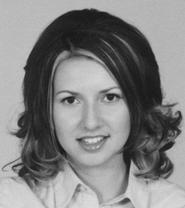
Elena Filekova '08 (Gabrovo, Bulgaria) is a double major in mathematics and economics and has taken numerous Hamilton economics courses in which she learned, understandably, a great deal about the U.S. economy. She is also well-read in EU economic development. She was surprised, however, to learn how little had been published about her own country of Bulgaria, set to enter the EU in 2007. What was the preparation for this entry doing to Bulgaria's economy? What effects would this have on states already in the EU or future members? No one had dealt with these questions and Filekova, interested, applied for and was granted a Levitt Research Fellowship to study the macroeconomic effects of the Bulgarian integration into the European Union.
The common belief regarding the EU is that the joining states benefit far more than the current members, who are forced to fund the improvement of their newer fellows. The condition of a country joining the EU is, however, rather more complicated than it first appears; a joining member faces numerous challenges and tends to be economically fragile. Simultaneously, the adoption of the common EU Monetary Policy deprives the entering state from using certain economic tools (price levels or interest and exchange rates) to converge to EU economic standards. A country such as Bulgaria, preparing to enter the EU must, Filekova explains, "compensate the lack of macroeconomic flexibility with microeconomic flexibility." Bulgarian politicians have been planning a smooth entry into the EU for almost a decade, but the country still faces certain challenges such as the current standing of the Bulgarian economy and the development of public finances. In discussing the economic state of the EU in general and that of Bulgaria in particular, Filekova hopes to understand the macroeconomic effects and movements that occur when a state joins the EU.
Filekova is doing most of her writing in the U.S., but plans to spend part of August in Bulgaria conducting interviews and "filling in some gaps" in her research. Her work will be based mostly in progress reports from the EU, the IMF, and the World Bank, as well as publications from the Bulgarian government. She hopes also to work with non-governmental representatives such as Vasil Tsanov (Bulgarian Economic Institute) and Dr. Kostadin Pashev (Fulbright Scholar at Georgia State University). Erol Balkan, the James L. Ferguson Professor of Economics at Hamilton and Filekova's advisor for the project, will also be "an important source of guidance" throughout the research.
Filekova is ambitious and deeply passionate about her subject matter. At Hamilton she has been president of the Model European Union Club and the International Student Association. A rising junior, she plans to use her work this summer as a base for her senior thesis, which will also deal with the "complicated and very dynamic process" of Bulgarian economic development. And as for the future? She hopes to work in finance and then return to Bulgaria, perhaps some day to act as an economic consultant for the EU Commission.
The grant which funds her work is the Levitt Research Fellowship, funded by the Arthur Levitt Public Affairs Center. The grant is intended to fund research in a public affairs issue and allows a student to spend 10 weeks working closely with a faculty advisor.
- Lisbeth Redfield
Posted June 19, 2006
